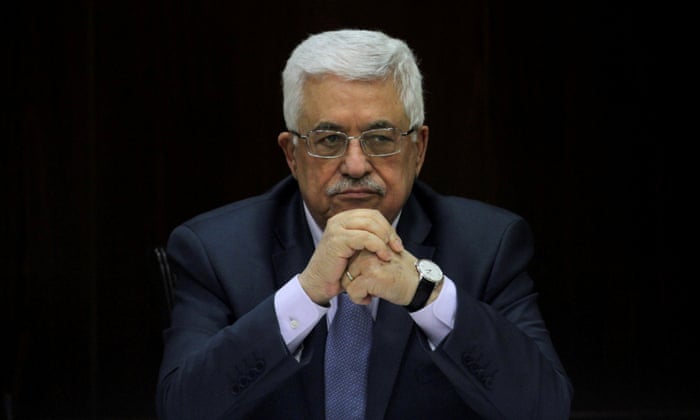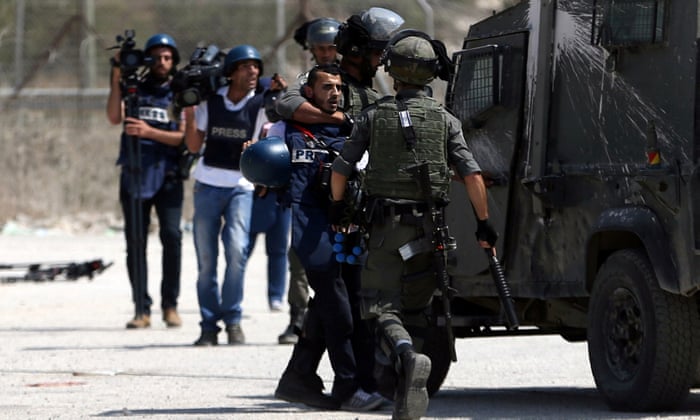Palestinian journalists face crackdown as Abbas tightens grip on media
The leader of the Palestinian Authority is looking to increase his reach amid power struggles with rivals
Mahmoud Abbas has introduced the repressive Electronic Crimes Law. Photograph: Reuters




Palestinian journalists face manhandling by both Israeli and Palesinian police. Photograph: Mohamad Torokman/Reuters
 Peter Beaumont-Sunday 3 September 2017
Peter Beaumont-Sunday 3 September 2017
The reasons given by Palestinian Authority security forces when they arrested the journalist Tariq Abu Zaid were deeply contradictory.
Abu Zaid, a reporter with the Hamas-affiliated Al-Aqsa TV in the northern West Bank city of Nablus, was originally told that he was being detained in retaliation for the Gaza arrest by Hamas of a journalist from a media organisation supportive of President Mahmoud Abbas’s Fatah party.
But once in jail, Abu Zaid told the Observer, the story changed and he was told that he was being pursued under the controversial new Electronic Crimes Law, introduced by Abbas earlier this summer, for posts he had made on Facebook in which he had sarcastically criticised the Palestinian Authority.
Abu Zaid is not alone in being targeted by the Palestinian security services. He is one of five journalists arrested on a single day last month; others have been called in for questioning in a growing crackdown on both the media and expressions of dissent on social media.
The campaign began in June with the Palestinian Authority’s decision to shut down roughly 30 critical websites. Palestinian officials have moved on to target individuals, amid accusations that the unpopular and ageing Abbas, 82, is becoming ever more authoritarian as he clings to power.
Among the websites closed down were operations belonging to Palestinian political parties, opposition and independent media outlets, as well as al-Quds Network, a volunteer-run community news outlet.
Since then, however, according to a new report from Amnesty Internationalreleased last month, that campaign has widened to allow Palestinian authorities in the West Bank to subject journalists and activists “to arbitrary arrests, violent interrogations, confiscation of equipment, physical assaults and bans on reporting”.
“The last few months have seen a sharp escalation in attacks by the Palestinian authorities on journalists and the media in a bid to silence dissent, said Amnesty’s Magdalena Mughrabi.
“This is a chilling setback for freedom of expression in Palestine. By rounding up journalists and shutting down opposition websites, the Palestinian authorities in the West Bank and the Gaza Strip appear to be using police-state tactics to silence critical media and arbitrarily block people’s access to information.”
While human rights groups have often accused Abbas of restricting freedoms, the latest moves mark a new departure, driven in large part by the escalating power struggles between Hamas, Abbas and the president’s chief Fatah rival, Mohammed Dahlan.
And at times, according to interviews conducted by the Observer, the ostensible reasons for arrest have been unquestionably petty – not least the detention of one journalist for taking a picture of prime minister Rami Hamdallah’s convoy on his mobile phone.
The most significant concern among human rights and freedom of speech advocates centres on the Electronic Crimes Law, which Abbas introduced by presidential decree – without any public consultation or debate – in July. Although the Palestinian attorney general, Ahmad Barak, has stressed that the law is not intended to punish criticism of the “Palestinian government, president, official or political parties”, critics say it is being used precisely for that purpose by the increasingly authoritarian and unpopular Abbas.
The new law, under which journalists such as Tariq Abu Zaid are being pursued, allows prosecutors to impose heavy fines or detention on anyone – including journalists and whistleblowers – judged to have been critical of the authorities online on the grounds of “disturbing public order”, “national unity”, “social peace” or “contempt of religion”.
Among those who have been caught up in the recent clampdown has been Fadi Arouri, a photojournalist who works for the Chinese news agency Xinhua. Arouri was summoned for interrogation and shown Facebook posts which, he was told, “could lead to disorder in the society”.
Another journalist who was arrested in the crackdown is Jihad Barakat, who works for a media services provider in Ramallah. He was detained for three days after he took a picture on his phone of the prime minister’s convoy as it halted near an Israeli checkpoint.
“I was travelling in a taxi and saw the convoy and took a picture but then a group of men came and found me and asked who was taking photographs.
“I said it was me, and that I was a journalist,” recalled Barakat, who is still facing a court summons despite agreeing to delete the pictures, which were never published. He has little doubt about the reason for his arrest.
“It’s a procedure they are using against journalists and journalism. The day after my arrest the new Electronic Crimes Law was introduced and in the same week four other journalists were arrested.”
Tariq Abu Zaid – who like Barakat will appear before the courts in the next few months – echoes the photographer’s sentiment. “It is getting worse every month,” he said, speaking in his office in Nablus.
“The intention, as I understand it, is that the Palestinian Authority wants to silence journalists.”
The leader of the Palestinian Authority is looking to increase his reach amid power struggles with rivals
Mahmoud Abbas has introduced the repressive Electronic Crimes Law. Photograph: Reuters




Palestinian journalists face manhandling by both Israeli and Palesinian police. Photograph: Mohamad Torokman/Reuters
 Peter Beaumont-Sunday 3 September 2017
Peter Beaumont-Sunday 3 September 2017 The reasons given by Palestinian Authority security forces when they arrested the journalist Tariq Abu Zaid were deeply contradictory.
Abu Zaid, a reporter with the Hamas-affiliated Al-Aqsa TV in the northern West Bank city of Nablus, was originally told that he was being detained in retaliation for the Gaza arrest by Hamas of a journalist from a media organisation supportive of President Mahmoud Abbas’s Fatah party.
But once in jail, Abu Zaid told the Observer, the story changed and he was told that he was being pursued under the controversial new Electronic Crimes Law, introduced by Abbas earlier this summer, for posts he had made on Facebook in which he had sarcastically criticised the Palestinian Authority.
Abu Zaid is not alone in being targeted by the Palestinian security services. He is one of five journalists arrested on a single day last month; others have been called in for questioning in a growing crackdown on both the media and expressions of dissent on social media.
The campaign began in June with the Palestinian Authority’s decision to shut down roughly 30 critical websites. Palestinian officials have moved on to target individuals, amid accusations that the unpopular and ageing Abbas, 82, is becoming ever more authoritarian as he clings to power.
Among the websites closed down were operations belonging to Palestinian political parties, opposition and independent media outlets, as well as al-Quds Network, a volunteer-run community news outlet.
Since then, however, according to a new report from Amnesty Internationalreleased last month, that campaign has widened to allow Palestinian authorities in the West Bank to subject journalists and activists “to arbitrary arrests, violent interrogations, confiscation of equipment, physical assaults and bans on reporting”.
“The last few months have seen a sharp escalation in attacks by the Palestinian authorities on journalists and the media in a bid to silence dissent, said Amnesty’s Magdalena Mughrabi.
“This is a chilling setback for freedom of expression in Palestine. By rounding up journalists and shutting down opposition websites, the Palestinian authorities in the West Bank and the Gaza Strip appear to be using police-state tactics to silence critical media and arbitrarily block people’s access to information.”
While human rights groups have often accused Abbas of restricting freedoms, the latest moves mark a new departure, driven in large part by the escalating power struggles between Hamas, Abbas and the president’s chief Fatah rival, Mohammed Dahlan.
And at times, according to interviews conducted by the Observer, the ostensible reasons for arrest have been unquestionably petty – not least the detention of one journalist for taking a picture of prime minister Rami Hamdallah’s convoy on his mobile phone.
The most significant concern among human rights and freedom of speech advocates centres on the Electronic Crimes Law, which Abbas introduced by presidential decree – without any public consultation or debate – in July. Although the Palestinian attorney general, Ahmad Barak, has stressed that the law is not intended to punish criticism of the “Palestinian government, president, official or political parties”, critics say it is being used precisely for that purpose by the increasingly authoritarian and unpopular Abbas.
The new law, under which journalists such as Tariq Abu Zaid are being pursued, allows prosecutors to impose heavy fines or detention on anyone – including journalists and whistleblowers – judged to have been critical of the authorities online on the grounds of “disturbing public order”, “national unity”, “social peace” or “contempt of religion”.
Among those who have been caught up in the recent clampdown has been Fadi Arouri, a photojournalist who works for the Chinese news agency Xinhua. Arouri was summoned for interrogation and shown Facebook posts which, he was told, “could lead to disorder in the society”.
Another journalist who was arrested in the crackdown is Jihad Barakat, who works for a media services provider in Ramallah. He was detained for three days after he took a picture on his phone of the prime minister’s convoy as it halted near an Israeli checkpoint.
“I was travelling in a taxi and saw the convoy and took a picture but then a group of men came and found me and asked who was taking photographs.
“I said it was me, and that I was a journalist,” recalled Barakat, who is still facing a court summons despite agreeing to delete the pictures, which were never published. He has little doubt about the reason for his arrest.
“It’s a procedure they are using against journalists and journalism. The day after my arrest the new Electronic Crimes Law was introduced and in the same week four other journalists were arrested.”
Tariq Abu Zaid – who like Barakat will appear before the courts in the next few months – echoes the photographer’s sentiment. “It is getting worse every month,” he said, speaking in his office in Nablus.
“The intention, as I understand it, is that the Palestinian Authority wants to silence journalists.”
